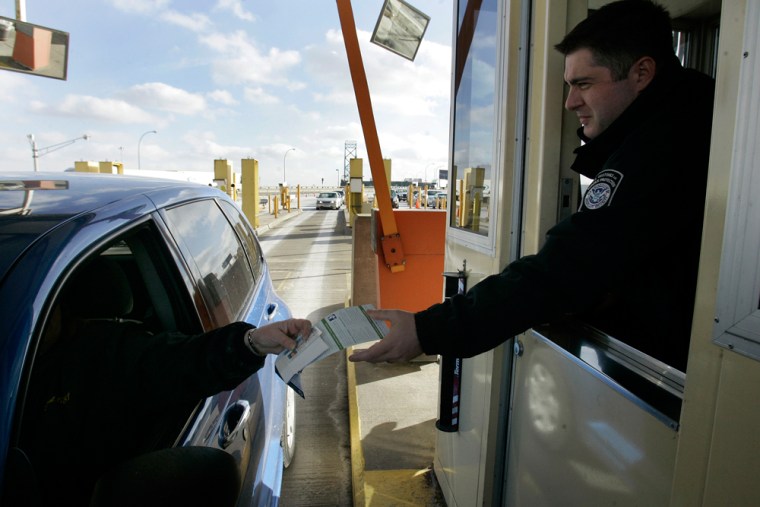New rules for the types of identification U.S. or Canadian citizens must present to cross into the country shouldn't cause significant delays and won't be strictly enforced at first, a senior federal official said.
Under the rules going into effect Thursday, people will no longer be allowed to simply declare to immigration officers at border crossings that they are citizens, said Jayson Ahern, deputy commissioner with U.S. Customs and Border Protection.
Instead, those 19 and older will have to show proof of citizenship — a passport, trusted traveler card or a birth certificate and government-issued ID such as a driver's license.
"We'll be asking those who cross our borders to present to us secure, more reliable documents to prove citizenship and to confirm their identity," said Ahern, who is heading a national effort to call attention to the changes.
Officers at the ports will have latitude to admit people who are unaware of the changes once their identities are confirmed, Ahern said. Ron Smith, a spokesman for U.S. Customs and Border Protection in Detroit, which has the busiest northern border crossing, said the agency will provide a grace period for travelers without the extra ID, and will hand out fliers explaining the changes.
"The first couple of days, weeks maybe, could add a few seconds to the inspection process. But once people become aware of these requirements, and we're getting the word out to them ... those minor delays should disappear," Smith said.
Casino Windsor, across the Detroit River from the United States, is buying radio ads to inform its American customers that they can still visit without passports. Casino spokeswoman Holly Ward said any changes to border requirements risk driving away business.
Smith said few people have crossed the northern border by just declaring their nationality since the 2001 terrorist attacks, because officers have always had the discretion to request documents.
Congress approved the Western Hemisphere Travel Initiative in 2004, which requires verified citizenship and identification of all those entering the country from Canada, Mexico and the Caribbean. The passport requirement for land and sea crossings has been delayed until June 2009.
Mexican citizens will continue to have to present valid passports and visas. Canadian citizens previously were not required to show a passport, but will need one after next year.
Last week, Mexican tourism officials in Tijuana introduced a "Get Your Passport" campaign that gives U.S. passport holders discounts at restaurants and shops.
Quincy Epperson of San Diego said he will stop going to Mexico until he replaces his birth certificate. He has an old photocopy but worries it won't pass muster with inspectors.
"I don't want to take the chance," said Epperson, 31, as he returned Tuesday from one of his weekly visits to Tijuana's sports betting parlors. If he wins his Super Bowl bet on the Giants, Epperson will send a friend to Tijuana collect his money.
Over the last two fiscal years, 31,000 people who claimed at the borders to be U.S. citizens were not, Ahern said.
Critics, particularly in northern border states, have assailed Department of Homeland Security Secretary Michael Chertoff over the changes. Sen. Norm Coleman, R-Minn., accused him of not understanding "the practical effects of DHS policies on the everyday lives of border community residents."
But Ahern said new passport cards the size of credit cards will allow citizens to cross the U.S.-Mexican border effectively and efficiently. Applications should be available starting Friday, although processing will take three to four months. Cards without previously issued passports will cost $45 for adults and $35 for children; they will cost $20 and $10, respectively, for those with passports.
Drivers' licenses enhanced with proof of citizenship and a radio frequency identification chip also will be accepted, Ahern added. Four states including Arizona have signed up for a federal program to offer the licenses. British Columbia also is experimenting with similar new high-tech licenses.
Ahern said he does not expect delays at entry ports over the new requirements — contradicting Chertoff's comments earlier this month that longer lines will be inevitable at first.
